|
|
|
Sort Order |
|
|
|
Items / Page
|
|
|
|
|
|
|
| Srl | Item |
| 1 |
ID:
149258
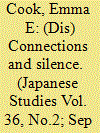

|
|
|
|
|
| Summary/Abstract |
Doing work that is characterized by instability and low incomes, Japanese male part-time workers often remain in the natal home well into adulthood even in cases where there is considerable discord and where familial bonds are strained or complicated. Through detailed case studies this article examines how, for some male part-time workers, a desire to disconnect from familial kin in the search for individual autonomy leads to the creation of alternative forms of relatedness. Meanwhile, for others, pressure to work in particular ways combined with the negotiations of complex family relationships – especially with (male) heads of households – contributes to alienation from family and society. Although work status is not the only cause of family strain, gendered work expectations and labour pressures considerably contribute to discord and can lead to significant experiences of social exclusion and disconnection from the family and wider society.
|
|
|
|
|
|
|
|
|
|
|
|
|
|
|
|
| 2 |
ID:
175486
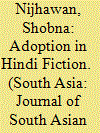

|
|
|
|
|
| Summary/Abstract |
This article examines gendered lives in vernacular fiction by focusing on the topic of child adoption as fictionalised in Hindi literature in late colonial India (1920s). It argues that non-conformance and non-normativity dominated the short stories selected for this article. The feature of non-conformance towards normative assumptions in middle-class Hindu society also concerned Hindi literary realism of the time more generally, especially when presenting a diversity of intergenerational relationships between women, men, children and youth within the family setting, as well as beyond. The narratives discussed here show how social norms set by caste, class, gender, religion and biology were surpassed when it came to imagined family constellations in the late colonial period.
|
|
|
|
|
|
|
|
|
|
|
|
|
|
|
|
| 3 |
ID:
120703
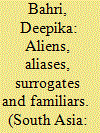

|
|
|
|
|
| Publication |
2013.
|
| Summary/Abstract |
In this essay, I argue that alienation and familiarity serve as mobile matrices for understanding the affectively experienced impact of transnational migration in certain of Jhumpa Lahiri's short stories. While we may think of alienation as a precondition of migrant identity, it is a condition that is familiar to most of us in different contexts. How does alienation, thus plurally conceived, figure in the experience of migrants, producing the relay between heimlich/unheimlich experiences? Moreover, in the socio-cultural context of globalisation, how does transnational migration challenge conventional notions of family, a word associated with notions of familiarity and filiation that are seemingly antonymous to the idea of alienation? These are the questions I set out to answer, concluding that the 'family' is always a unit composed by its very hauntings, surrogates, and absences.
|
|
|
|
|
|
|
|
|
|
|
|
|
|
|
|
| 4 |
ID:
097454
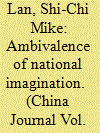

|
|
|
| 5 |
ID:
121886
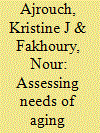

|
|
|
|
|
| Publication |
2013.
|
| Summary/Abstract |
The purpose of this study was to provide a critical perspective on the needs of aging Muslims by focusing on a diverse group of older adults including those with ancestry from African American, South Asian, Arab, and Albanian origins. Four focus group discussions were conducted with adults aged 60+ recruited from four Muslim centers in the metro-Detroit area. Grounded analysis uncovered themes related to needs, strengths and challenges in the Muslim community, as well as suggestions for the way forward in addressing aging issues. Needs identified include quality of life and social relations. Strengths included references to tradition and scripture. Challenges named referred to conflict both within and outside of the family. Finally, the way forward consisted of the desire for options to support aging families within the community, often in small steps, though not necessarily only through mosques. Findings also suggested that women may be a key agent of change within the Muslim community. In sum, this study uncovered areas of overlap and at times disagreement between and within groups, underlining the fact that there is no one kind of Muslim aging, and that any approach to caring for Muslims must combine cultural sensitivity with flexibility in order to minimize anxiety and stress for both elders and their families.
|
|
|
|
|
|
|
|
|
|
|
|
|
|
|
|
| 6 |
ID:
137927


|
|
|
|
|
| Summary/Abstract |
Over the past decade, growing numbers of young Filipinas have entered Denmark on the au pair scheme. While its official aim is to broaden the cultural horizons of youth, researchers generally view Filipina au pairing as a form of labour migration using au pairs as inexpensive domestic workers. This article argues that, despite this critique, au pairing does play an important formative role for young Filipinas because it opens up for experiences abroad that enable them to be recognised as independent adults in Philippine society. Rather than autonomy, however, au pairs define their independence in terms of their capacity to assume responsibility for others, thereby achieving a position of social respect. Based on ethnographic fieldwork in Denmark and the Philippines, this article explores how young Filipinas use the social, economic, and cultural resources they gain from their au pair stay abroad to re-position themselves vis-à-vis family and friends at home.
|
|
|
|
|
|
|
|
|
|
|
|
|
|
|
|
| 7 |
ID:
122995
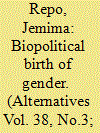

|
|
|
|
|
| Publication |
2013.
|
| Summary/Abstract |
This article argues that gender was invented in the 1950s as a new sexual apparatus of biopower. Through a reading of mid-century sexological studies against the background of structural-functionalist and behaviorist theories of social order, it shows how gender was born in the clinic to discipline the reproduction of life in new ways. The truth of sex was no longer found in the genitals or mind, but in the contingent cognitive processes of a behavioral control system. The gender apparatus produced systematized protocols for sex reassignment surgeries for infants with ambiguous genitalia and rendered the family a panoptic institution, all to ensure that children were socialized into normative gender roles guaranteeing the continued reproduction of the life of the species. The violence of this new life-administering technology was crystallized in the pedagogical techniques employed by physicians designed to persuade their child patients to submit themselves to the normalizing care of surgeons and psychiatrists.
|
|
|
|
|
|
|
|
|
|
|
|
|
|
|
|
| 8 |
ID:
101273
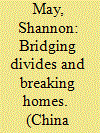

|
|
|
|
|
| Publication |
2010.
|
| Summary/Abstract |
This article highlights the case of a rural north-east Chinese village where youth labour mobility is a marriage strategy deployed by parents and engaged in by young people given constraints on education and income in the countryside. While some rural mothers and their daughters do make the fairytale of "marrying-up" into an urban household come true, for most rural young women migrants the self-oriented consumption that they are encouraged to pursue free of rural domestic responsibilities sets them up for heartbreak when they are brought back for a rural marriage. As long as rural households are left to rely on the "insurance" of land and a younger generation to work it and provide labour of domestic subsistence, they will pull sons (and wives for them) back to the countryside, and try to marry daughters to urban households to expand their network of security. This new twist on an old managerial strategy sets up a tragic conflict: young men are encouraged to return to the countryside, while young women are pushed to provide a "uniting bridge" into the city and, when they fail, are brought back to the countryside for marriage. If the experiences of families in Huangbaiyu village are not an anomaly but signal a broader trend, a generation of returnee young women who are frustrated and angry in rural marriages and abandon their husbands and parents-in-law will dramatically influence the future of China's development.
|
|
|
|
|
|
|
|
|
|
|
|
|
|
|
|
| 9 |
ID:
159510


|
|
|
| 10 |
ID:
176924
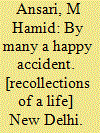

|
|
|
|
|
| Publication |
New Delhi, Rupa Publications India Pvt Ltd, 2021.
|
| Description |
xiii, 369p.hbk
|
| Standard Number |
9789390356270
|
|
|
|
|
|
|
|
|
|
|
|
Copies: C:1/I:0,R:0,Q:0
Circulation
| Accession# | Call# | Current Location | Status | Policy | Location |
| 059976 | 923.254/ANS 059976 | Main | On Shelf | General | |
|
|
|
|
| 11 |
ID:
180003
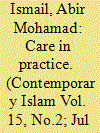

|
|
|
|
|
| Summary/Abstract |
Recent studies conclude that ethnic minority families in Denmark tend to be dismissive of senior housing and municipal homecare services for elderly family members. A large proportion of Muslim minority families in Denmark attach great importance to caring for the elderly as a tradition and prefer to take care of their own elderly family members at home. Nevertheless, the fact that morality, incentives, and obligations in relation to care for the elderly may be legitimized and/or contested with reference to cultural traditions and Islam has not received much attention in current research. In this article, drawing on material from ongoing ethnographic fieldwork among Arab Muslim families in Denmark, I discuss how cultural and religious backgrounds may determine and influence perceptions and behavior regarding care for the elderly. By observing and engaging in the everyday life of an Arab Muslim family, I explore how caring for elderly people with health problems at home raises specific questions about obligations and triggers negotiations across genders and generations. I argue that besides kinship and ethnicity, it is equally important to consider religiosity in an attempt to learn more about how Arab Muslims care for their elderly family members.
|
|
|
|
|
|
|
|
|
|
|
|
|
|
|
|
| 12 |
ID:
192177
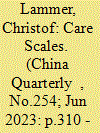

|
|
|
|
|
| Summary/Abstract |
Examining the “world's largest cash-based social policy” through the lens of care reveals widely shared scalar imaginaries and the productivity of care in constituting scale. In standardizing the minimum livelihood guarantee (dibao), officials, applicants and researchers in rural Sichuan cited both “too much” and “not enough” care at the scale of the family in recommending or rejecting state assistance. Different levels of organization (scale1) were not stable bases with specific sizes and qualities (scale2) that enabled or limited care. Dibao-related practices were evaluated as an appropriate (“filial piety”), insufficient (“individualism”) or excessive (“corruption”) amount of family care. Care became an indicator of kinship measurements and a marker of state boundaries. Thus, scale (in both meanings) was enacted in China, as elsewhere, through negotiations of needs and responsibilities, through evaluations of care practices and their outcomes. In this sense, care scales.
|
|
|
|
|
|
|
|
|
|
|
|
|
|
|
|
| 13 |
ID:
092405
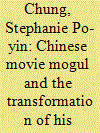

|
|
|
|
|
| Publication |
2009.
|
| Summary/Abstract |
The Cathay Organisation was a household name in the Chinese film industry. At its peak, it operated 75 cinemas and two movie studios, with a film distribution network spanning Malaysia, Burma, Thailand, Vietnam, Hong Kong, and Taiwan, as well as Europe and Latin America. In the public's mind, Cathay was synonymous with its charismatic founder, Loke Wan Tho (1915-1964). Well versed in literature and ornithology, Loke appeared as a British gentleman, always meticulously dressed and elegantly mannered in his dealings with political leaders and movie celebrities. But underneath its gracious surface, Cathay was constantly struggling to sustain itself against problems that arose due to its rapid expansion. Although Cathay often produced impressive movies with graceful stars, high production costs could not be supported by the box-office revenues. By tracing the transformation of Cathay, this article will examine the dynamics of a Chinese family business in its attempt to survive amidst political chaos in Southeast Asia. Surviving generational succession, corporate consolidation and waves of political crises, Cathay's story not only mirrors the transformation of an overseas Chinese family business over the past 100 years but also reflects a larger historical picture.
|
|
|
|
|
|
|
|
|
|
|
|
|
|
|
|
| 14 |
ID:
178756
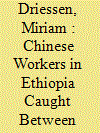

|
|
|
|
|
| Summary/Abstract |
Ever since Beijing has sought to fuel domestic growth through Chinese-led development overseas—first under the aegis of Jiang Zemin’s Going Out Policy and more recently as part of Xi Jinping’s Belt and Road Initiative—thousands of Chinese have moved overseas for work. Africa has been one of the destinations of Chinese companies and their expatriate staff. Although we have learned a great deal about China’s mega-projects across the African continent, little is known about the certified engineers and experienced builders who carry them out. What brings them to Africa? And, more importantly, what makes them stay for years on end, even if they wish to return to China? In this article I zoom in on the lives of Chinese men employed in Ethiopia’s construction industry to show how three decades of domestic growth in China has pushed workers overseas, while jeopardizing their return. Workers’ lives are marked by double displacement. They are not only isolated from local African communities through a dormitory labour regime that controls their time and limits their mobility, but also, more importantly, they are displaced from social life in China. Domestic development has at once increased aspirations and made them harder to obtain, especially for men, who are expected to fulfill the promise of upward social mobility for themselves and their families. In order to realize aspirations and meet social expectations related to social reproduction, geographic mobility has become a necessity for men who cannot rely on family wealth or connections, forcing them into a state of suspension.
|
|
|
|
|
|
|
|
|
|
|
|
|
|
|
|
| 15 |
ID:
120701
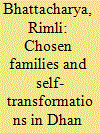

|
|
|
|
|
| Publication |
2013.
|
| Summary/Abstract |
In the Indian subcontinent, the understanding of 'the family' in numerous narrative traditions has always extended into relationships with non-humans, with a pivotal emphasis on the guru-shishya (preceptor-disciple) relationship. This paper focuses on the highly popular English-language 'juvenile fiction' of Dhan Gopal Mukerji to suggest how he reconfigured these narrative traditions for a primarily non-Indian audience in the 1920s-30s. The paper considers Mukerji's young protagonists-invariably male, whether human or animal-in relation to the web of familial and outside social relationships through which the 'quest motif' is played out for a transnational readership. The epic form pervades his 'jungle books' through the figures of the animal protagonists, the search for a leader/guide/guru, and a re-imagining of caste, ethnicity and gender. Of particular interest is the composite mother figure. Dhan Gopal's oeuvre for children maps out a socialisation that is 'free' of the apparatus of the colonial home or of other disciplining institutional sites. Paradoxically, the search to be 'free from fear' can only be played in the alternative topos of the jungle, where violence is inescapable. How, if at all, may these narrative tropes be mapped onto contemporary history?
|
|
|
|
|
|
|
|
|
|
|
|
|
|
|
|
| 16 |
ID:
181812
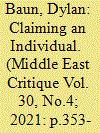

|
|
|
|
|
| Summary/Abstract |
Imad Nuwayhid (1944–1975) was a young Lebanese leftist intellectual, hotel employee, and fighter for the Lebanese Communist Party. Alongside thousands of others, he died during the first phase of the Lebanese Civil War (1975–1976). This article explores Imad’s life, death, and legacy through the methodology of ‘Microhistory.’ Consulting Imad’s writings alongside party sources, and conducting interviews with those who knew him, it serves as a window into the politics of memorialization in the Lebanese Civil War with a focus on the Lebanese Left. It argues that multiple actors, ranging from party to family members, produced Imad’s ‘martyr narrative.’ Like others of the era, regardless of party, the narrative stressed ideology and sacrifice over individuality to mobilize the living to fight. These strategies did not, however, unfold without resistance. In the case of Imad, some family challenged the party, positing counter-narratives and claiming Imad as theirs: a Nuwayhid. Their actions seek to restore Imad as an individual, but not always as he lived. These findings contribute to the literature on the Lebanese Civil War and its memory, providing a personal touch through a new and novel level of analysis: the individual, their sources, and the battle over memory that surrounds them.
|
|
|
|
|
|
|
|
|
|
|
|
|
|
|
|
| 17 |
ID:
173172
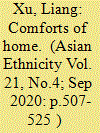

|
|
|
|
|
| Summary/Abstract |
Since the turn of the millennium, the rapid development of China-Africa relations has facilitated large-scale migration between African countries and China. By reviewing the complex history of Chinese migration in South Africa – the most popular destination for Chinese migrating to the continent, this article highlights the changing and evolving forms of family among Chinese migrants in Africa. This article utilizes data from historical documents, personal memoirs, first-hand fieldwork, as well as secondary research. It argues that the changing forms of Chinese migrant families in South Africa have been shaped at different points in time by the capitalist economy, apartheid policies, and the internal dynamics of the Chinese diasporic communities. The new forms of familial arrangements have been critical in fight for social inclusion and security among Chinese migrants in South Africa.
|
|
|
|
|
|
|
|
|
|
|
|
|
|
|
|
| 18 |
ID:
117930
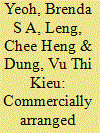

|
|
|
|
|
| Publication |
2013.
|
| Summary/Abstract |
Globalization and increased mobilities have multiplied cross-border transactions not only in the economic sphere but have also a major impact on human relationships of intimacy. This can be seen in the increased volume of differently mediated forms of international marriage, not just straddling 'east' and 'west', but within Asia and across different ethnicities and nationalities. International marriage raises a host of social issues for countries of origin and destination, including challenges relating to the citizenship status and rights of the marriage migrant. This paper examines the negotiation of citizenship rights in the case of commercially matched marriage migrants - namely Vietnamese women who marry Singaporean men and migrate to Singapore as 'foreign brides'. While they are folded into the 'family' - what is often thought of as the basic building block of the nation in Asian societies - they are not necessarily accorded full incorporation into the 'nation' despite Singapore's claims to multiculturalism. This is particularly salient at a point when cross-nationality, cross-ethnicity marriages between Singapore citizens and non-citizens are on the increase, accounting for over a third of marriages registered in Singapore in recent years. Vietnamese women who marry Singaporeans are positioned within the nation-state's citizenship regime as dependents of Singaporean men, having to rely on the legitimacy of the marriage relationship as well as the whims of their husbands in negotiating their rights vis-à-vis the Singapore state. Drawing on interviews and ethnographic work with 20 Vietnamese women who are commercially matched marriage migrants, the paper first focuses on the vulnerable positions these women find themselves, particularly given difficulties in forging their own support networks as well as weaknesses of the civil society sector in what has been called an 'illiberal democracy' characterized by a political culture of 'non-resistance'. The paper then goes on to examine the way they negotiate rights to residency/citizenship, work and children within webs of asymmetrical power relations within the family and the nation-state. We draw on our findings to show that citizenship is 'a terrain of struggle' within a multicultural nation-state shaped by social ideologies of gender, race and class and negotiated on an everyday basis within spheres of family intimacy.
|
|
|
|
|
|
|
|
|
|
|
|
|
|
|
|
| 19 |
ID:
117931
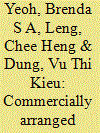

|
|
|
|
|
| Publication |
2013.
|
| Summary/Abstract |
Globalization and increased mobilities have multiplied cross-border transactions not only in the economic sphere but have also a major impact on human relationships of intimacy. This can be seen in the increased volume of differently mediated forms of international marriage, not just straddling 'east' and 'west', but within Asia and across different ethnicities and nationalities. International marriage raises a host of social issues for countries of origin and destination, including challenges relating to the citizenship status and rights of the marriage migrant. This paper examines the negotiation of citizenship rights in the case of commercially matched marriage migrants - namely Vietnamese women who marry Singaporean men and migrate to Singapore as 'foreign brides'. While they are folded into the 'family' - what is often thought of as the basic building block of the nation in Asian societies - they are not necessarily accorded full incorporation into the 'nation' despite Singapore's claims to multiculturalism. This is particularly salient at a point when cross-nationality, cross-ethnicity marriages between Singapore citizens and non-citizens are on the increase, accounting for over a third of marriages registered in Singapore in recent years. Vietnamese women who marry Singaporeans are positioned within the nation-state's citizenship regime as dependents of Singaporean men, having to rely on the legitimacy of the marriage relationship as well as the whims of their husbands in negotiating their rights vis-à-vis the Singapore state. Drawing on interviews and ethnographic work with 20 Vietnamese women who are commercially matched marriage migrants, the paper first focuses on the vulnerable positions these women find themselves, particularly given difficulties in forging their own support networks as well as weaknesses of the civil society sector in what has been called an 'illiberal democracy' characterized by a political culture of 'non-resistance'. The paper then goes on to examine the way they negotiate rights to residency/citizenship, work and children within webs of asymmetrical power relations within the family and the nation-state. We draw on our findings to show that citizenship is 'a terrain of struggle' within a multicultural nation-state shaped by social ideologies of gender, race and class and negotiated on an everyday basis within spheres of family intimacy.
|
|
|
|
|
|
|
|
|
|
|
|
|
|
|
|
| 20 |
ID:
157485
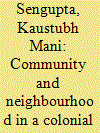

|
|
|
|
|
| Summary/Abstract |
This article on the history of neighbourhoods (para) of colonial Calcutta considers the processes through which this peculiar spatial unit emerged in the colonial city, where community identities were fostered as well as contested. Seen as a place, a secured, stable location which helped in forming the community in an alien atmosphere, the para was a liminal space, neither a purely affective unit nor an administrative category, and neither a purely public or private domain. Borrowing liberally from each register to generate a unique spatial experience, paras were at the same time deeply exclusionary and also starkly patriarchal zones. The article brings forth these various strands in the history of the neighbourhood to enrich the understanding of colonial urbanism, Bengali society and culture.
|
|
|
|
|
|
|
|
|
|
|
|
|
|
|
|
|
|
|
|
|